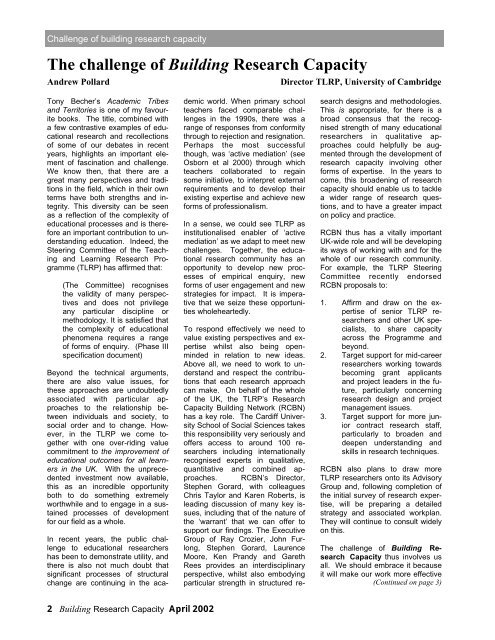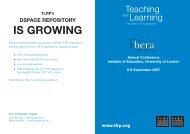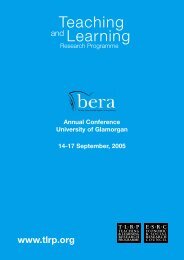Issue 2: the qualitative foundation of quantity - Teaching and ...
Issue 2: the qualitative foundation of quantity - Teaching and ...
Issue 2: the qualitative foundation of quantity - Teaching and ...
You also want an ePaper? Increase the reach of your titles
YUMPU automatically turns print PDFs into web optimized ePapers that Google loves.
Challenge <strong>of</strong> building research capacity<br />
The challenge <strong>of</strong> Building Research Capacity<br />
Andrew Pollard<br />
Director TLRP, University <strong>of</strong> Cambridge<br />
Tony Becher’s Academic Tribes<br />
<strong>and</strong> Territories is one <strong>of</strong> my favourite<br />
books. The title, combined with<br />
a few contrastive examples <strong>of</strong> educational<br />
research <strong>and</strong> recollections<br />
<strong>of</strong> some <strong>of</strong> our debates in recent<br />
years, highlights an important element<br />
<strong>of</strong> fascination <strong>and</strong> challenge.<br />
We know <strong>the</strong>n, that <strong>the</strong>re are a<br />
great many perspectives <strong>and</strong> traditions<br />
in <strong>the</strong> field, which in <strong>the</strong>ir own<br />
terms have both strengths <strong>and</strong> integrity.<br />
This diversity can be seen<br />
as a reflection <strong>of</strong> <strong>the</strong> complexity <strong>of</strong><br />
educational processes <strong>and</strong> is <strong>the</strong>refore<br />
an important contribution to underst<strong>and</strong>ing<br />
education. Indeed, <strong>the</strong><br />
Steering Committee <strong>of</strong> <strong>the</strong> <strong>Teaching</strong><br />
<strong>and</strong> Learning Research Programme<br />
(TLRP) has affirmed that:<br />
(The Committee) recognises<br />
<strong>the</strong> validity <strong>of</strong> many perspectives<br />
<strong>and</strong> does not privilege<br />
any particular discipline or<br />
methodology. It is satisfied that<br />
<strong>the</strong> complexity <strong>of</strong> educational<br />
phenomena requires a range<br />
<strong>of</strong> forms <strong>of</strong> enquiry. (Phase III<br />
specification document)<br />
Beyond <strong>the</strong> technical arguments,<br />
<strong>the</strong>re are also value issues, for<br />
<strong>the</strong>se approaches are undoubtedly<br />
associated with particular approaches<br />
to <strong>the</strong> relationship between<br />
individuals <strong>and</strong> society, to<br />
social order <strong>and</strong> to change. However,<br />
in <strong>the</strong> TLRP we come toge<strong>the</strong>r<br />
with one over-riding value<br />
commitment to <strong>the</strong> improvement <strong>of</strong><br />
educational outcomes for all learners<br />
in <strong>the</strong> UK. With <strong>the</strong> unprecedented<br />
investment now available,<br />
this as an incredible opportunity<br />
both to do something extremely<br />
worthwhile <strong>and</strong> to engage in a sustained<br />
processes <strong>of</strong> development<br />
for our field as a whole.<br />
In recent years, <strong>the</strong> public challenge<br />
to educational researchers<br />
has been to demonstrate utility, <strong>and</strong><br />
<strong>the</strong>re is also not much doubt that<br />
significant processes <strong>of</strong> structural<br />
change are continuing in <strong>the</strong> academic<br />
world. When primary school<br />
teachers faced comparable challenges<br />
in <strong>the</strong> 1990s, <strong>the</strong>re was a<br />
range <strong>of</strong> responses from conformity<br />
through to rejection <strong>and</strong> resignation.<br />
Perhaps <strong>the</strong> most successful<br />
though, was ‘active mediation’ (see<br />
Osborn et al 2000) through which<br />
teachers collaborated to regain<br />
some initiative, to interpret external<br />
requirements <strong>and</strong> to develop <strong>the</strong>ir<br />
existing expertise <strong>and</strong> achieve new<br />
forms <strong>of</strong> pr<strong>of</strong>essionalism.<br />
In a sense, we could see TLRP as<br />
institutionalised enabler <strong>of</strong> ‘active<br />
mediation’ as we adapt to meet new<br />
challenges. Toge<strong>the</strong>r, <strong>the</strong> educational<br />
research community has an<br />
opportunity to develop new processes<br />
<strong>of</strong> empirical enquiry, new<br />
forms <strong>of</strong> user engagement <strong>and</strong> new<br />
strategies for impact. It is imperative<br />
that we seize <strong>the</strong>se opportunities<br />
wholeheartedly.<br />
To respond effectively we need to<br />
value existing perspectives <strong>and</strong> expertise<br />
whilst also being openminded<br />
in relation to new ideas.<br />
Above all, we need to work to underst<strong>and</strong><br />
<strong>and</strong> respect <strong>the</strong> contributions<br />
that each research approach<br />
can make. On behalf <strong>of</strong> <strong>the</strong> whole<br />
<strong>of</strong> <strong>the</strong> UK, <strong>the</strong> TLRP’s Research<br />
Capacity Building Network (RCBN)<br />
has a key role. The Cardiff University<br />
School <strong>of</strong> Social Sciences takes<br />
this responsibility very seriously <strong>and</strong><br />
<strong>of</strong>fers access to around 100 researchers<br />
including internationally<br />
recognised experts in <strong>qualitative</strong>,<br />
quantitative <strong>and</strong> combined approaches.<br />
RCBN’s Director,<br />
Stephen Gorard, with colleagues<br />
Chris Taylor <strong>and</strong> Karen Roberts, is<br />
leading discussion <strong>of</strong> many key issues,<br />
including that <strong>of</strong> <strong>the</strong> nature <strong>of</strong><br />
<strong>the</strong> ‘warrant’ that we can <strong>of</strong>fer to<br />
support our findings. The Executive<br />
Group <strong>of</strong> Ray Crozier, John Furlong,<br />
Stephen Gorard, Laurence<br />
Moore, Ken Pr<strong>and</strong>y <strong>and</strong> Gareth<br />
Rees provides an interdisciplinary<br />
perspective, whilst also embodying<br />
particular strength in structured research<br />
designs <strong>and</strong> methodologies.<br />
This is appropriate, for <strong>the</strong>re is a<br />
broad consensus that <strong>the</strong> recognised<br />
strength <strong>of</strong> many educational<br />
researchers in <strong>qualitative</strong> approaches<br />
could helpfully be augmented<br />
through <strong>the</strong> development <strong>of</strong><br />
research capacity involving o<strong>the</strong>r<br />
forms <strong>of</strong> expertise. In <strong>the</strong> years to<br />
come, this broadening <strong>of</strong> research<br />
capacity should enable us to tackle<br />
a wider range <strong>of</strong> research questions,<br />
<strong>and</strong> to have a greater impact<br />
on policy <strong>and</strong> practice.<br />
RCBN thus has a vitally important<br />
UK-wide role <strong>and</strong> will be developing<br />
its ways <strong>of</strong> working with <strong>and</strong> for <strong>the</strong><br />
whole <strong>of</strong> our research community.<br />
For example, <strong>the</strong> TLRP Steering<br />
Committee recently endorsed<br />
RCBN proposals to:<br />
1. Affirm <strong>and</strong> draw on <strong>the</strong> expertise<br />
<strong>of</strong> senior TLRP researchers<br />
<strong>and</strong> o<strong>the</strong>r UK specialists,<br />
to share capacity<br />
across <strong>the</strong> Programme <strong>and</strong><br />
beyond.<br />
2. Target support for mid-career<br />
researchers working towards<br />
becoming grant applicants<br />
<strong>and</strong> project leaders in <strong>the</strong> future,<br />
particularly concerning<br />
research design <strong>and</strong> project<br />
management issues.<br />
3. Target support for more junior<br />
contract research staff,<br />
particularly to broaden <strong>and</strong><br />
deepen underst<strong>and</strong>ing <strong>and</strong><br />
skills in research techniques.<br />
RCBN also plans to draw more<br />
TLRP researchers onto its Advisory<br />
Group <strong>and</strong>, following completion <strong>of</strong><br />
<strong>the</strong> initial survey <strong>of</strong> research expertise,<br />
will be preparing a detailed<br />
strategy <strong>and</strong> associated workplan.<br />
They will continue to consult widely<br />
on this.<br />
The challenge <strong>of</strong> Building Research<br />
Capacity thus involves us<br />
all. We should embrace it because<br />
it will make our work more effective<br />
(Continued on page 3)<br />
2 Building Research Capacity April 2002

















